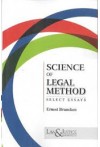- Author(s): Ernest Bruncken
- Publisher: Law and Justice Publishing Co
- Edition: Indian Economy Rp 2025
- ISBN 13 9789348076632
- Approx. Pages 594 + Contents
- Format Paperback
- Approx. Product Size 21 x 14 cms
- Delivery Time 3-5 working days (within Kerala & South India) (Others 7-9 days)
- Shipping Charge Extra (see Shopping Cart)
......................................................................................................................................
Description
The greatest question of legal theory nowadays in the arena of professional debate, both in Europe and America, is this: What is the inherent nature of the judicial and the legislative functions, and of the difference between them? What respective parts do judge and legislator perform in the declaring or formulating of law? And what are the materials or data which they respectively employ in this process of law-declaring? In short, is there any inherent necessity for two distinct. functionaries? And if there is, what are the respective limitations and requirements in their methods of reason- ing?
It might seem singular that such a fundamental debate should not have matured in professional thought, before the era of to-day. Can this tardiness be accounted for? Does political history account for it?
We must recall the fact that even as late as the rise of the Frankish State, the preponderance of influence in the development of economic life and in the admin- istration and evolution of private law on the Continent lay with the mark assemblies and other local jurisdictions, and that there could be no question, under these simpler conditions of social grouping, of a method, either of, or in, the law.
We must remember, too, that under any of the regal systems obtaining in Europe before the French Revo- lution, the judges were invariably the king's appointees, and that the struggles to determine the location of legislative power were essentially, in their vital personal
......................................................................................................................................
Table of Contents
Part I The Problem of the Judge
Chapter 1. Judicial Freedom of Decision: its Necessity and Method
Chapter 2. Judicial Freedom of Decision: its Principles and Objects
Chapter 3. Dialecticism and Technicality : the Need of Sociological Method
Chapter 4. Equity and Law : Judicial Freedom of Decision
Chapter 5. The Perils of Emotionalism : Sentimental Administration of Justice - its Relation to Judicial Freedom of Decision
Chapter 6. Judicial Interpretation of Enacted Law
Chapter 7. Courts and Legislation
Chapter 8. The Operation of the Judicial Function in English Law
Chapter 9. Codified Law and Case - Law : Their Part in Shaping the Policies of Justice
Chapter 10. Methods of Juridical Thinking
Part II The Problem of the Legislator
Chapter 11. Methods for Scientific Codification
Chapter 12. the Legislative Technic of Modern Civil Codes
Chapter 13. Scientific Method in Legislative Drafting
......................................................................................................................................
Author Details
Ernest Bruncken

